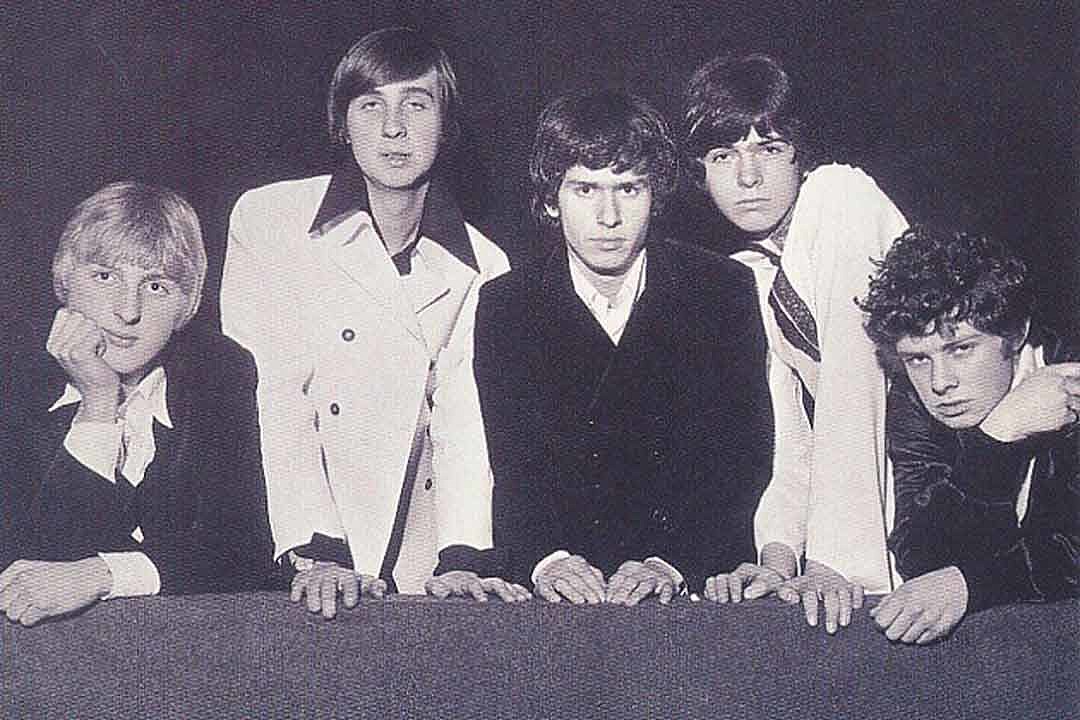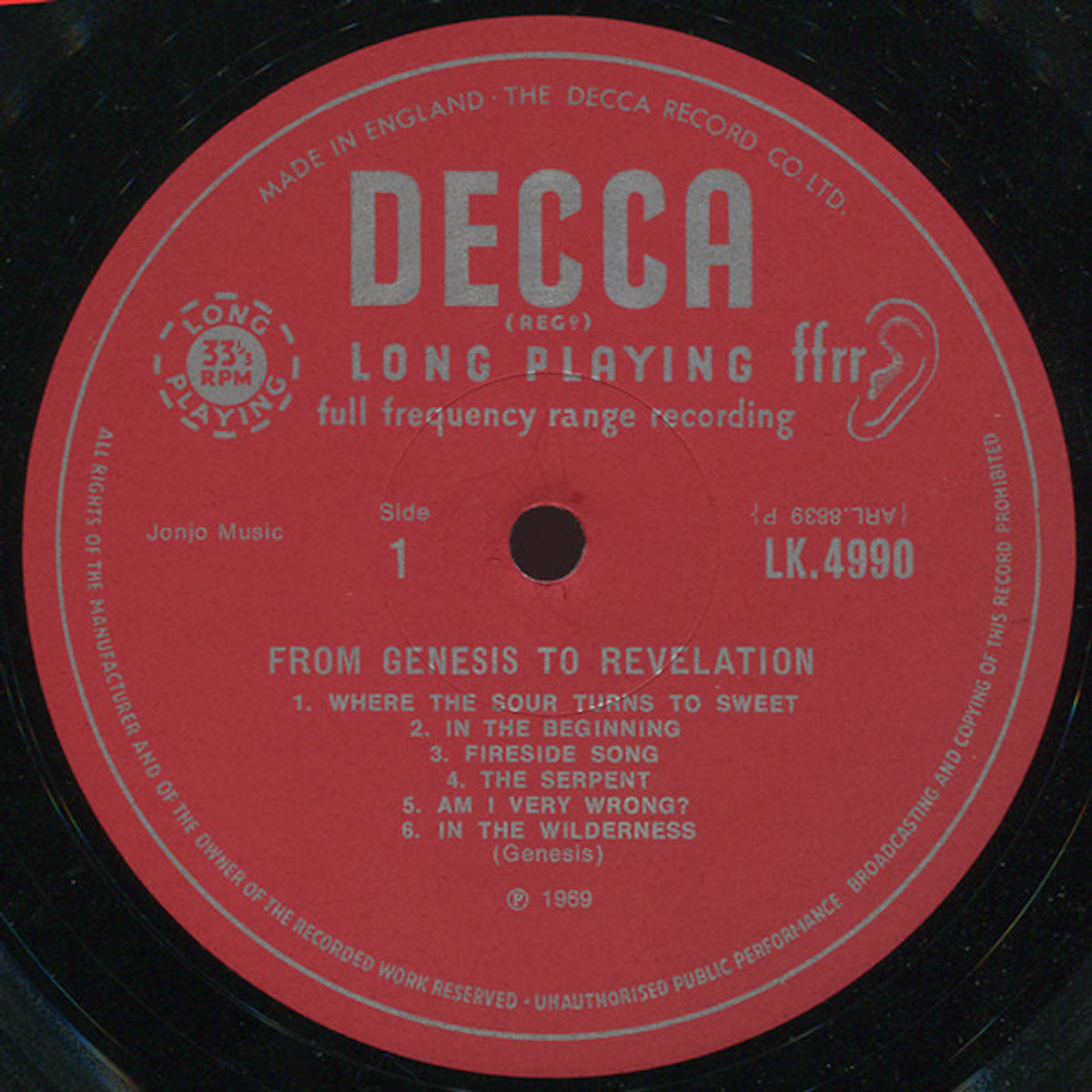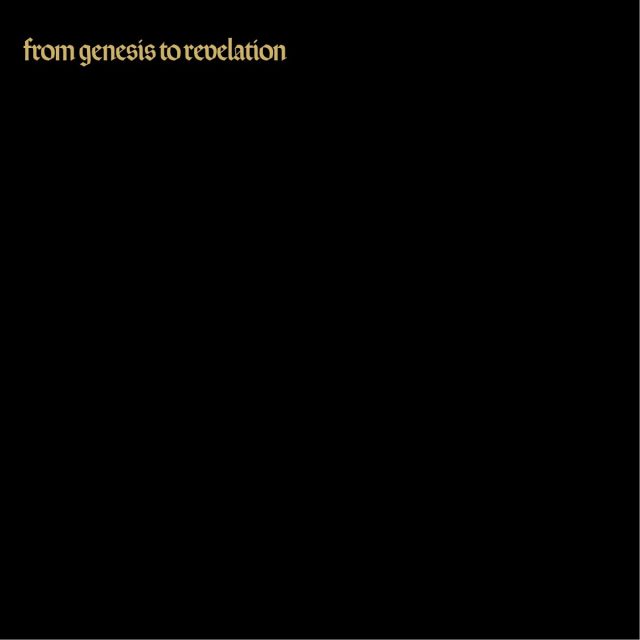 I ended up with the first Genesis album in exactly the way Peter Gabriel feared I would — I found it in a bin at Woolworth’s with a bunch of Christian cassettes.
I ended up with the first Genesis album in exactly the way Peter Gabriel feared I would — I found it in a bin at Woolworth’s with a bunch of Christian cassettes.
The British prog rock band’s first album was initially released in an all-black cover with Biblical-looking, minimalist script which read simply: From Genesis To Revelation in the top-left corner. Unlike so many shoppers, however, I didn’t mistake the discount tape as religious material. It’s actually a 1960s pop album, not unlike the kind of stuff The Bee Gees did in the late ’60s.
But Gabriel and company believed one of the reasons their debut went unnoticed is shop owners stocked it with the Christian stuff. It’s about as far from that as it is from the kind of music which eventually made Genesis famous, or the kind of music which later made them rich. This is a band with a few phases and progressions in their sound.
The reason the debut remains unnoticed is it’s mostly awful. From Genesis To Revelation came out in March, 1969. Back then, the band was Gabriel on vocals, Anthony Phillips on guitar, Chris Stewart and John Silver on drums and the only two original members still with the band — keyboardist Tony Banks and bass player Mike Rutherford.
Phillips had stage fright and hated playing so many gigs. After the band recorded their followup album Trespass in 1970, he quit the band on the advice of his doctor. Stewart was apparently an awful drummer and was fired before the debut album came out. He only plays drums on one song — the first single Silent Sun. The rest of the album is Silver. He only stuck around for five months until August, before being replaced by John Mayhew. He opted to go to university rather than play in a band.
Jonathan King was the guy who signed Genesis — and named them. He also is the one who laced the debut album with string arrangements, much to the ire of Phillips. He went on to produce 10cc and The Bay City Rollers. Using the pseudonym of Sakkarin, in 1971 he released his own version of the half-Canadian hit Sugar Sugar, made famous by The Archies. This is what Genesis were up against.

I actually like a few songs on the debut album, and personally own a weird 1981 Spanish pressing called Gigantes Del Pop Vol. 24. The cover art is a live shot of the band from the 1976 tour, similar to the Seconds Out album cover.
It opens with Where The Sour Turns To Sweet, strangely similar to The Monkees Theme, with its finger snap and hi-hat intro. It starts off cool, but turns to cheese in no time — aided by an absolutely god-awful production and sickly strings. The acoustic guitar is thin and badly mic’d. The sound of the pick is too loud, like those Syd Barrett solo records. There’s basically no drums on this at all and the showbix-Mexican horns in the chorus are supremely dated and stupid.
Next up is In The Beginning, with its awesome sci-fi buzz intro. This would have been a better album opener. The production sounds different, but equally poor — especially the drums. There was a real effort to make this one psychedelic. SF Sorrow meets The Bee Gees. But in 1969, this was already old hat.
The ballad Fireside Song is next. It begins promisingly enough with just piano, then it all goes strings and more badly-recorded acoustic guitar. It’s really bad. Oh Peter, these lyrics. It has both “once upon a time” and “it came to pass.” This song is catsick on the sofa which will take you 4:18 to clean up.
Next up is the the pretentiously titled The Serpent. God only knows what the hell is going on with the false-start intro on this — a bit of guitar noodling set to annoying hand drum. Just as it gets a riff going, it stops and the real song starts — with a different and much more defined riff. It’s a bluesy kind of thing in the sphere of early Jethro Tull or Aynsley Dunbar Retaliation.
Am I Very Wrong? is next, beginning with piano and — what is that, zither? It’s just an intro before the acoustic ballad begins. It’s not awful, and perhaps the first song which provides a hint as to the kind of stuff which would show up on Trespass, minus what I believe is a very high French horn or trumpet. This song couldn’t be more British unless Ray Davies showed up in short pants and boiled it.
The last song on the first side is the best one — In The Wilderness has a great, catchy chorus. The strings don’t seem out of place on this, given the era but they are entirely too loud. Gabriel has also found his voice, which is nice.

Side 2 kicks off with the album’s best song — The Conqueror. Though I have no idea why it begins with a short instrumental refrain from the previous song. The Conqueror has a great chorus and solid verses overtop of a tried-and-true chord sequence.
In Hiding is next, more ’60s ballady schlock with a male ensemble chorus and then a Herman’s Hermits-esque pop progression — but without drums or any real hook. And again, jeezus the strings are loud.
Then we get One Day, which is basically the same sort of thing except with playful Cat Stevensy piano. The chorus could have been good without the trumpets. Makes you want to hunt down Sgt. Pepper and hit him in the back of the head with an oboe. The production on this is not great, and ohhh… they try a weak attempt at an A Day In The Life ending. Big held chord. Stop that.
Guess what? Another ballad next — Window. This thing is absolutely forgettable. This is why most people shouldn’t write lyrics separately from the music. Word salad set to boring acoustic guitar and a weak attempt at a psychedelic poppet chorus. I hate it.
The appropriately named In Limbo comes afterward. This one could have been good without the variety show horns and more drums which are frustratingly thin.
Then it’s time for the first single, which actually came out before the album. Silent Sun is quite a good song. The only one featuring Stewart on drums. He doesn’t sound that bad to me. Nobody would notice the difference. As a producer, King lacked an adequate command of dynamics. Stuff needs to come and go, not just start and keep going until the end.
A Place To Call My Own follows this. Seems unfinished, musically. Like it was not much more than a poem. It’s a dated ballad, like most everything else. A decidedly shitty way to end the record — one that, I should mention, has no solos.
Having just listened to the whole album, there’s only a handful I can recall enough to sing or hum from memory. This album would have benefitted from being shorter — it’s 43 minutes long! Sgt. Pepper is only 39. It also had horrid production choices, but it’s hard to say no to the producer when he’s the guy who signed you. That said, you can count me among the fans who consider Trespass the actual first Genesis album. This right here is exactly why the decision was made to shelve Elton John’s first album — Regimental Sgt. Zippo — and release Empty Sky instead. Ah well.
1/5
• • •
Area Resident is an Ottawa-based journalist, recording artist, music collector and re-seller. Hear (and buy) his music on Bandcamp, email him HERE, follow him on Instagram and check him out on Discogs.











































